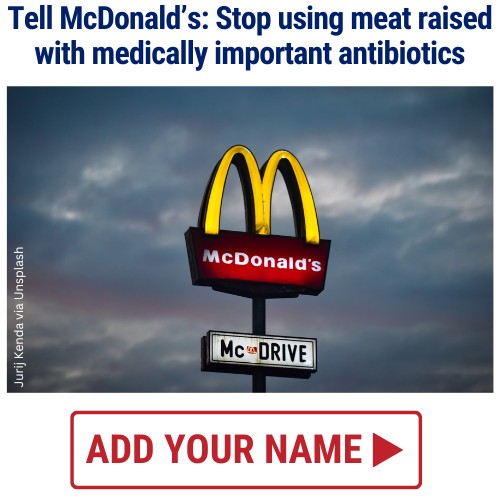
 |
John,
McDonald's needs to honor its commitments to dramatically reduce the use of antibiotics in its beef supply chains.
In the U.S., more than 2.8 million antimicrobial-resistant infections occur each year. More than 35,000 people die from treatable illnesses like skin infections, urinary tract infections and foodborne infections as a result.1
We'll be delivering messages about antibiotic overuse at McDonald's annual shareholder meeting on May 19. There is no better time to add your voice than right now. Send a message today.
The very nature of how antibiotics work means that the more you use them, the faster they become ineffective. So, overuse is a major threat to be avoided. And yet nearly two-thirds of medically important antibiotics sold in the United States are sold for use on livestock. Often, these animals aren't even sick.2
This practice is breeding antibiotic-resistant strains of bacteria that are especially difficult, or even impossible, to treat.
Vital medicine shouldn't be used in ways that make it less effective, or to compensate for unsanitary, overcrowded farming conditions. Send a message to McDonalds before May 19.
Experts project that by 2050, more people could die from antibiotic-resistant infections than from cancer.3
Unless we change course, that is.
McDonald's committed in 2018 to get on a path to dramatically reduce, and ultimately end, the routine use of antibiotics in its beef supply -- but now it's walking those goals back.4
McDonald's must honor its 2018 pledge and set an aggressive timeline for its beef suppliers to stop routinely using antibiotics except to treat disease and prevent the suffering and death of animals.
As the largest purchaser of beef in the United States, McDonald's has a unique ability to determine the future of antibiotic use in the beef industry. Add your name today and have your message delivered in person.
Thank you,
Faye Park
President
1. "Antimicrobial Resistance Facts and Stats," Centers for Disease Control and Prevention, February 4, 2025.
2. Michael J. Martin, Sapna E Thottathil, and Thomas B. Newman, "Antibiotics Overuse in Animal Agriculture: A Call to Action for Health Care Providers," National Library of Medicine,
3. Liam Sacino, "McDonald's: Hold the Antibiotics," PIRG, April 22, 2025.
4. Liam Sacino, "McDonald's: Hold the Antibiotics," PIRG, April 22, 2025.
Support U.S. PIRG. Contributions by people just like you make our advocacy possible. Your contribution supports a staff of organizers, attorneys, scientists and other professionals who monitor government and corporate decisions and advocate on the public's behalf.
Join us on Facebook | Follow us on Twitter
U.S. PIRG, Main Office: 1543 Wazee St., Suite 460, Denver, CO 80202, (303) 801-0582
Federal Advocacy Office: 600 Pennsylvania Ave. SE, 4th Fl., Washington, DC 20003, (202) 546-9707
Member Questions or Requests: 1-800-838-6554.

If you want us to stop sending you email then follow this link -- unsubscribe.